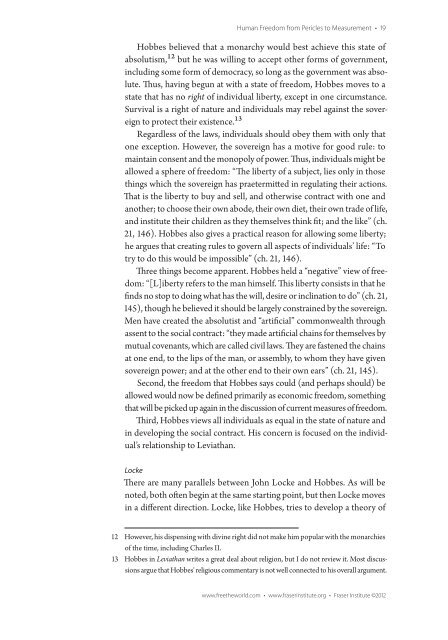Towards a Worldwide Index of Human Freedom
Towards a Worldwide Index of Human Freedom
Towards a Worldwide Index of Human Freedom
Create successful ePaper yourself
Turn your PDF publications into a flip-book with our unique Google optimized e-Paper software.
<strong>Human</strong> <strong>Freedom</strong> from Pericles to Measurement • 19<br />
Hobbes believed that a monarchy would best achieve this state <strong>of</strong><br />
absolutism,12 but he was willing to accept other forms <strong>of</strong> government,<br />
including some form <strong>of</strong> democracy, so long as the government was absolute.<br />
Thus, having begun at with a state <strong>of</strong> freedom, Hobbes moves to a<br />
state that has no right <strong>of</strong> individual liberty, except in one circumstance.<br />
Survival is a right <strong>of</strong> nature and individuals may rebel against the sovereign<br />
to protect their existence.13<br />
Regardless <strong>of</strong> the laws, individuals should obey them with only that<br />
one exception. However, the sovereign has a motive for good rule: to<br />
maintain consent and the monopoly <strong>of</strong> power. Thus, individuals might be<br />
allowed a sphere <strong>of</strong> freedom: “The liberty <strong>of</strong> a subject, lies only in those<br />
things which the sovereign has praetermitted in regulating their actions.<br />
That is the liberty to buy and sell, and otherwise contract with one and<br />
another; to choose their own abode, their own diet, their own trade <strong>of</strong> life,<br />
and institute their children as they themselves think fit; and the like” (ch.<br />
21, 146). Hobbes also gives a practical reason for allowing some liberty;<br />
he argues that creating rules to govern all aspects <strong>of</strong> individuals’ life: “To<br />
try to do this would be impossible” (ch. 21, 146).<br />
Three things become apparent. Hobbes held a “negative” view <strong>of</strong> freedom:<br />
“[L]iberty refers to the man himself. This liberty consists in that he<br />
finds no stop to doing what has the will, desire or inclination to do” (ch. 21,<br />
145), though he believed it should be largely constrained by the sovereign.<br />
Men have created the absolutist and “artificial” commonwealth through<br />
assent to the social contract: “they made artificial chains for themselves by<br />
mutual covenants, which are called civil laws. They are fastened the chains<br />
at one end, to the lips <strong>of</strong> the man, or assembly, to whom they have given<br />
sovereign power; and at the other end to their own ears” (ch. 21, 145).<br />
Second, the freedom that Hobbes says could (and perhaps should) be<br />
allowed would now be defined primarily as economic freedom, something<br />
that will be picked up again in the discussion <strong>of</strong> current measures <strong>of</strong> freedom.<br />
Third, Hobbes views all individuals as equal in the state <strong>of</strong> nature and<br />
in developing the social contract. His concern is focused on the individual’s<br />
relationship to Leviathan.<br />
Locke<br />
There are many parallels between John Locke and Hobbes. As will be<br />
noted, both <strong>of</strong>ten begin at the same starting point, but then Locke moves<br />
in a different direction. Locke, like Hobbes, tries to develop a theory <strong>of</strong><br />
12 However, his dispensing with divine right did not make him popular with the monarchies<br />
<strong>of</strong> the time, including Charles II.<br />
13 Hobbes in Leviathan writes a great deal about religion, but I do not review it. Most discussions<br />
argue that Hobbes' religious commentary is not well connected to his overall argument.<br />
www.freetheworld.com • www.fraserinstitute.org • Fraser Institute ©2012


